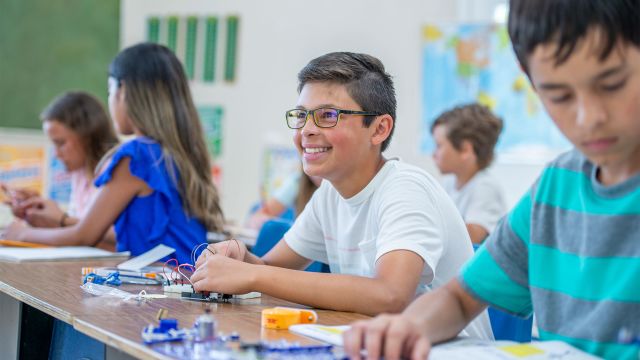Updated on July 19, 2024.
Closing the book on summer break and heading back to school can be a struggle for any child. But back-to-school time can be particularly stressful for kids with attention deficit hyperactivity disorder (ADHD), says Charan Cheema, DO, a family medicine specialist in Livonia, Michigan.
Why is it so important to start on the right foot? Doing so can mean the difference between a year filled with good grades and social success versus a year of anguish, poor school performance, and behavioral problems. Here are eight ways parents of kids with ADHD can help ensure a smooth and successful transition to school—and help them stay on track all year long.
Set up a calendar
At the start of school, your child may be making resolutions that this is the year they’ll get—and stay—organized. Several well-thought-out calendars can help them get there.
Look for one organizer that is large enough for them to write down all their assignments, plus a second one where they can log after-school programs and events, along with social activities like parties or playdates, advises Cheema.
Kids who are old enough to have their own smartphones or tablets may also benefit from a digital calendar, since these offer reminders and pop-up notifications. Have your child share their digital calendar with you to keep you in the loop.
Create an ‘out-the-door’ checklist
You probably know that a clear, rigid morning routine is crucial to helping your kid with ADHD make it to the bus on time. And it goes without saying that a morning spent searching for lost socks, homework, and lunch boxes can make anyone crabby.
That’s why it’s a good idea to have a checklist your child can use to itemize tasks like making their bed, getting dressed, eating breakfast, brushing their teeth, and gathering their homework and lunch box before they head out the door, says Cheema.
Make sure you have backups at the ready, like hats, mittens, or pairs of shoes. These have a tendency to mysteriously disappear in households, so having extras will help guarantee you and your kid keep moving forward.
Touch base with your teacher
If your child has ADHD, you may already have an IEP (individualized education program), a written plan of goals and accommodations that help ensure a student makes progress. But there are other strategies you can employ to help make sure your child’s doing okay.
A communication binder that goes between school and home will allow you and your child’s teacher to share notes about daily behavior and progress, explains Cheema. This sort of regular contact also helps make sure the teacher is following through on needed accommodations, like giving your child breaks or extra time to complete their work.
Teachers can also seat your child in a part of the classroom where they’re least likely to get distracted, like up in front. If your child is older (say, middle or high school), consider asking if they can record lectures on their smartphone. This way, they can re-listen at their own pace and review any missed information at home.
Create a set homework routine
Kids with ADHD thrive on consistency, so it often helps to start and finish homework at the same time and place every evening, advises Cheema. Choose a part of your home that’s relatively distraction-free, and ideally somewhere where you can easily keep an eye on your child.
Allow frequent breaks, and imbue those breaks with a reward. For example, after finishing their spelling worksheet, let your child have a five-minute break to grab a snack and run around for a few moments. Make sure you offer positive reinforcement. Anytime they notch a success—even something small like sitting down at the table voluntarily to do their homework—praise them and explain exactly what they did well. Ignore negative behaviors, like whining.
You can also reward kids once homework is completely done by letting them play on their tablet or going outside. If they have a lot of trouble concentrating, you might try using a white noise machine or the sounds available from a relaxation program like Sharecare Windows (available on the Sharecare app for iOS and Android). Sounds like rainfall, waves, and soothing music may help maintain attention. Of course, if these add stress or distraction, it’s best to set them aside.
Carve out time for exercise
Physical activity is important for all kids but may be especially valuable for those with ADHD. Some studies suggest that regular exercise can improve attention, behavior, and motor control in young people with ADHD. The research isn’t yet definitive, but getting exercise is pretty low-risk, so it may be worth a try to work movement into your child’s afternoon routine.
Just remember that structured team sports can be challenging for some kids with ADHD, since they may have trouble following multi-step directions and/or coordination, points out Cheema. Other options include running, swimming, martial arts, or even just going on a family walk.
Help them stay focused
It can be hard for a child with ADHD to figure out which assignments take priority. You can make it easier for them by ensuring they have an assignment notebook to help organize their work.
Another good idea: color code everything. Colored folders can help your child organize work for different subjects like reading, math and writing, while highlighters will help them rank assignments by priority level. For example, use red to indicate a task due the next day, yellow for one due later in the week, and green for longer-term projects.
Clutter can also get in the way of staying organized, so it’s a good idea to do a clean sweep of backpacks, desks, and workspaces on a regular basis.
Set up some play dates
Establishing and maintaining friendships can be tough for kids with ADHD, since they often struggle with social skills. If your child has trouble making and keeping friends, setting up some structured play dates—where you can prep in advance for what’s expected—can help ease anxiety. Try to organize some outings with another child in class as early in the year as possible, and ideally before the first day of school.
“It can be easier those first few days if there’s a familiar face there with them,” says Cheema.
Ease back into medication
Some kids with ADHD take a “drug holiday” over the summer, especially if they’re experiencing side effects such as weight loss from decreased appetite due to stimulant meds. While most of these drugs have an immediate effect, it’s a good idea to start kids back on their regular dosage about a week before school resumes, says Cheema. This way, they have a chance to get used to the medication before the first day of class.
After that, you can follow your kids closely and speak to your physician about tweaking dosage as needed. Some kids may also need a “booster” dose after the school day to help them get through homework and after-school activities—and set them up for a successful next day.







